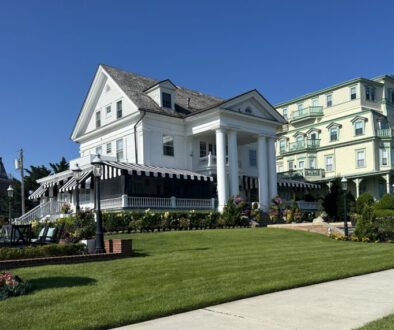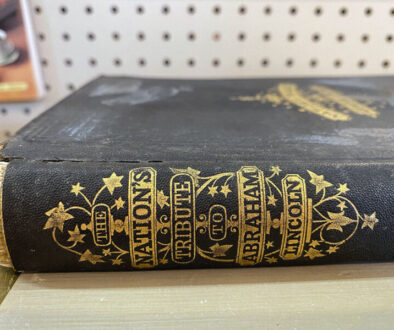Ben Ridings

With over 6,000 precious artifacts under his care, 36-year-old curator Ben Ridings maintains the Emlen Physick Estate as one of the most beloved Victorian house museums in the country.
In 2013, just weeks before graduating Stockton College with a degree in anthropology and sociology, Ben was hired as a MAC tour guide, introducing visitors to the opulent splendor of Cape May’s Physick House.
His passion for history and his charisma with the public caught the attention of MAC’s administration, who soon hired him as registrar in the organization’s museum division. In 2021, he became the full-time curator — the trusted steward of Cape May’s most treasured architectural gem.
Early one morning in mid-August, Ben met with me on the porch of the Physick house. I couldn’t help but realize that this interview would probably become another archived document of the Physick Estate’s ongoing history.
What drew you to the Physick Estate as a tour guide?
What drew me to this house was that it was a job in history. I love history and always wanted to get involved with that field in some way. I was familiar with the area because my parents always had a vacation house in West Wildwood. We always made it a point to come over to Cape May. So, I was familiar with Cape May but didn’t know much about the Physick family until I started here as a tour guide.
What’s your favorite thing in the Physick Estate?
That’s a tough question to answer. Even though I am no longer a tour guide, I still give tours to donors and special guests. One of the things I really love to do is play the 1908 phonograph for them. We have over a hundred of Dr. Physick’s records and I will play one on the phonograph for them. It’s always fun to see their reaction when it starts playing. Considering the record might be from 1903, it doesn’t sound horrible.
Do you ever play the phonograph for younger people who have never seen something like that?
Occasionally, yes, when I give first-person tours as Dr. Physick. For about six years I have been portraying the resident Dr. Physick.

Are there challenges in giving tours as Dr. Physick?
Everything we know about the family is by way of oral history or newspaper accounts. There’s so much we don’t know. So, if someone asks a very specific question, it’s tough because I might not know the answer. So, I handle that challenge one of two ways — I answer the question by speaking about what was common in the Victorian era or in Cape May. For instance, people always ask me what my favorite food is. I don’t know what Dr. Physick’s favorite food was so I will usually talk about the seafood in Cape May, since I know it was just as popular then as it is now. Another way I handle the challenge is to speak as a Victorian gentleman would. People will often ask very personal questions. They might be questions that someone of that era would find offensive or not appropriate to answer. So, I stay in character by acting hesitant or saying I shouldn’t discuss it, but at the same time I give them the information that best answers their question.
Are there still new discoveries being made about the house and family?
Yes. We never had much information about the staff of the house prior to 1900. Just last year, someone came on one of the candlelight tours here at the house. She said, “I have letters from an employee of Dr. Physick’s from the 1880s.” She copied them and sent them to us. The letters were between Dr. Physick and a man who was his gardener. It was the first time we had seen a reference to what Dr. Physick actually paid his staff. So, in 1880, this guy was paid 20 dollars a month, which back then was an average working person’s wage. We think he possibly lived here on the estate, so he would have had housing plus 20 dollars a month, which wasn’t bad.
Didn’t you and your colleague Steve Olszewski find something in the basement last year?
We did! Steve is my partner in crime around here. One day we were looking around the basement which is like a maze. There is an old toolbox down there. We’re not sure if it was Dr. Physick’s. We saw another box that we always assumed was a toolbox. But we opened it and saw that it was Dr. Physick’s ice box. It still had the label on it from 1898. We have an ice cream exhibit going on right now in the carriage house. One of our maintenance guys, Corey, is a carpenter and was able to put it back together since it was falling apart. And now it’s part of the exhibit.
If you actually lived in the Physick House, what feature of it would make it truly feel like home to you?
I’m a huge bibliophile. I’m always reading something. In Dr. Physick’s library we have his big, comfy chair and the huge bookcases filled with books. I consider that a really cozy room and I could definitely live there.
Was there a moment in your childhood that foreshadowed your current career?
Yes, and it goes back to my love of books. I grew up in Burlington Township and there was a branch of the county library that was built around the 1760s. It was filled with really old books. I remember walking in and thinking about how many people have passed through and that I’m just one of them. I knew the place had been there at the time of George Washington. It connects you to that.
Do you feel like that about this place?
Coming back here after the pandemic a few years ago, I was thinking about the flu epidemic of 1918. Dr. Physick had already died but his aunt was still living in the house. It made me realize that here we are a century later and we think we are so different, but the same thoughts and fears of the unknown were happening for someone in this house. Although there are a myriad of technological advancements, at the core people weren’t that different from us and what they wanted out of life.
If you could write a letter and leave it for whoever will be the curator of this house in 100 years, what would you say?
The spirit of that letter would be to the effect that the curator is part of a very special group of people who have maintained this house and who have kept the memory alive of those who lived here. I also feel that whoever is the curator of this house in100 years will have a lot in common with me in terms of challenges and accomplishments. I’m also well aware that I am standing on the shoulders of others, and I am appreciative of the work they have done.
How will that curator 100 years from now see the legacy of Ben Ridings?
I like social history, and I like getting to know the family as much as I can. So, I hope the curator years from now will look back and say, “Thank goodness that Ben Ridings guy did all the research he did. We know more about the family because of him.”
You seem to be connected with historical individuals and their social and cultural backdrop as much as you are in the tangible items and artifacts.
That’s one reason I like to portray Dr. Physick, because sometimes people look at history as something in a dusty book. Historical figures are often seen in some way as fictional characters in a story. If you teach history by talking about individuals, people will learn that history is made by ordinary people. I like to humanize history; it helps connect people to the past.
I think it’s wonderful how you present things in a way that people of all ages can connect with the past.
Kids really get it! You can see their faces light up. We have an old telephone in the house, and when there are kids here, I ask them to take out their cell phones and I ask them how often they actually call people with it. Then I show them the telephone in our exhibit. They really love it. I’ve even had people in their 30s comment that there are no buttons on it. I explain to them how you would speak to an operator who would dial your number. The telephone first came to Cape May in the late 1800s. Dr. Physick’s house was only one of two private residences that had a telephone. The other private telephone was for the guy who managed the phone company. In fact, I believe Dr. Physick’s telephone number was 27.
One last question. Do you ever dream about what it would be like to actually go back in time and talk with Dr. Physick?
The registrar and I often daydream and talk about things like that. I always say that if I had to pick only one person to talk to, I wouldn’t speak to anyone in the family. I would talk to a member of the staff, particularly Alice Johnson, who was the cook here for over 30 years. The family might be a bit standoffish, but the cook saw and heard everything and knew what was going on.



